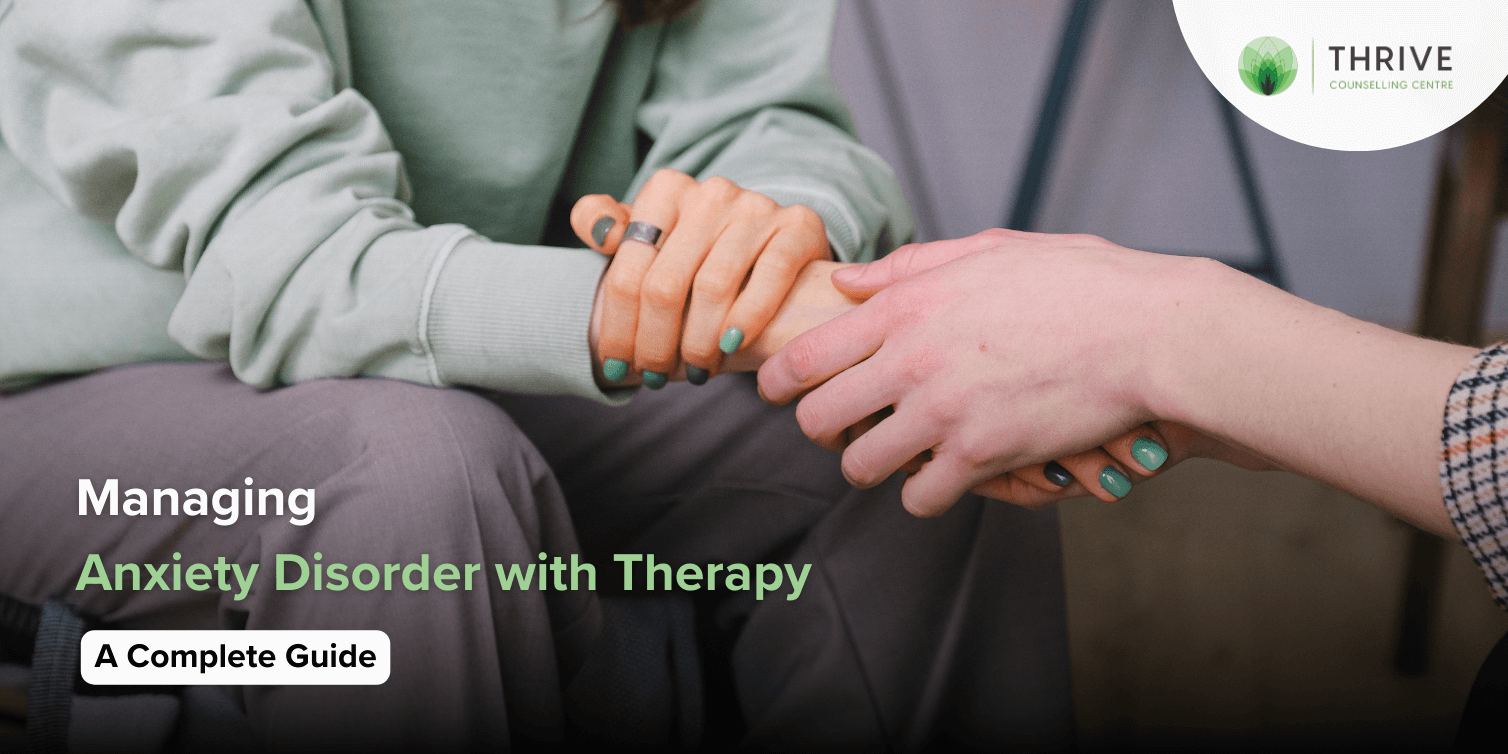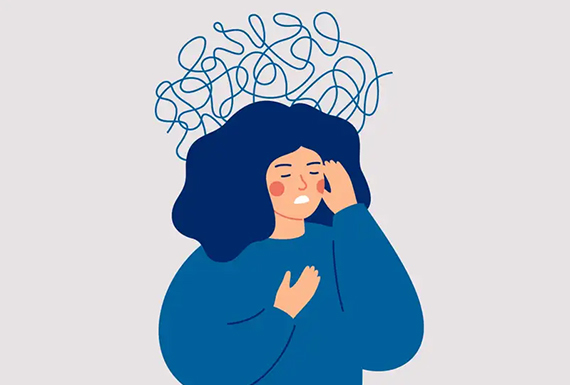Exploring Different Approaches in Counselling for Stress And Anxiety Condition for Enduring Adjustment
When dealing with anxiousness problems, it's necessary to discover a range of therapy strategies. Each approach uses special understandings and tools to assist you handle your signs and symptoms successfully. You could locate that incorporating methods can generate the ideal outcomes. Comprehending the subtleties of these strategies is essential to fostering enduring change. What if the right mix could launch a new level of emotional health for you?
Recognizing Anxiety Disorders: A Quick Review
Anxiousness problems, which influence millions of people worldwide, can significantly impact everyday life. You may experience frustrating sensations of fear or fret that seem irrepressible. These sensations can bring about physical signs like an auto racing heart, sweating, or even dizziness. Common kinds of anxiety problems include generalised anxiety condition, panic disorder, and social stress and anxiety problem. Each has distinct signs, yet they all share a tendency to disrupt your routine and relationships.Understanding the source of your stress and anxiety is vital. It may originate from genes, mind chemistry, or life experiences. Acknowledging your triggers can assist you handle your responses much better. It is very important to bear in mind that you're not alone in this struggle. Many individuals deal with comparable challenges, and seeking aid is a solid step toward sensation better. By discovering concerning anxiety problems, you're already on the path to understanding and handling your problem a lot more efficiently.
Cognitive-Behavioral Treatment: Testing Unfavorable Thought Patterns
In Cognitive-Behavioral Treatment, you'll begin by identifying the adverse idea causes that add to your anxiety. Once you recognize these thoughts, you'll deal with replacing them with even more positive alternatives. With each other, you'll build effective coping approaches to assist handle your stress and anxiety in day-to-day scenarios.
Identifying Negative Thought Triggers

When you experience moments of distress, identifying the particular triggers behind your negative ideas can be crucial in handling anxiousness. Begin by focusing on circumstances that prompt feelings of concern or worry. Is it a congested room, a future target date, or a discussion with particular people? Take down these circumstances in a journal. This will certainly help you determine patterns in your reasoning. Likewise, notification physical experiences that accompany your adverse thoughts, like an auto racing heart or rigidity in your upper body. By identifying these triggers, you get insight into what's fueling your stress and anxiety. Recognizing these links is the initial step in testing those thoughts and inevitably reclaiming control over your emotional reactions.
Changing Ideas With Positives
Challenging adverse idea patterns is a necessary action in changing your way of thinking and lowering anxiousness. You might usually locate yourself entraped in cycles of insecurity or disastrous reasoning. As opposed to allowing these ideas determine your sensations, technique changing them with sensible choices or positive affirmations. When you think, "I can't manage this," change it to, "I can manage challenges one action at a time." This straightforward change can substantially affect your emotion. Frequently identifying and responding to these negative ideas assists develop a much healthier internal discussion. Remember, it takes time and initiative, yet regularly practicing this technique can bring about long-term adjustment, equipping you to deal with stress and anxiety with restored confidence and durability.
Structure Coping Techniques Together
Changing negative thoughts is only the start of handling anxiety efficiently. To produce lasting adjustment, you need to build coping strategies that equip you. Cognitive-Behavioral Treatment (CBT) aids you identify and test those purposeless idea patterns. With each other, you and your therapist can check out exactly how these thoughts effect your feelings and behaviors.Start by developing practical strategies, like journaling or mindfulness workouts, that permit you to face stress and anxiety head-on. When you encounter your concerns gradually, you'll discover to react in different ways.

Mindfulness and Acceptance-Based Approaches: Growing Present-Moment Awareness
As you browse the complexities of stress and anxiety, integrating mindfulness and acceptance-based approaches can substantially improve your ability to grow present-moment understanding. By concentrating on the below and currently, you'll discover that you can observe your ideas and feelings without judgment (Counseling services for anxiety). This method helps you recognize your anxiousness without really feeling overwhelmed by it.Engaging in mindfulness exercises, such as deep breathing, body scans, or assisted meditations, allows you to ground on your own in your existing experience. Acceptance-based techniques motivate you to welcome your emotions as opposed to battle versus them. When you accept your feelings, they shed their power over you.Incorporating these techniques into your daily routine can change just how you react to anxiety. You'll establish resilience and discover to navigate demanding circumstances with greater convenience. Eventually, cultivating present-moment awareness lays the structure for enduring modification, empowering you to lead an extra satisfying life
Direct Exposure Treatment: Challenging Anxieties Gradually
Direct exposure therapy assists you face your anxieties in a steady means, making it much less overwhelming. You'll discover techniques to face anxiety-provoking situations detailed, while additionally constructing coping approaches to handle your responses. This strategy equips you to take control and minimize stress and anxiety in time.
Progressive Exposure Methods

When facing anxiousness, gradually challenging your worries can be an effective method to reclaim control. This method, referred to as progressive exposure, includes gradually subjecting on your own to the circumstances or things that activate your anxiousness. Begin with much less intimidating circumstances and slowly function your method approximately more tough ones. As an example, if you're worried of public speaking, you could begin by talking in front of a mirror, after that advance to sharing thoughts with a close friend, and ultimately address a little team. Each action helps desensitize you to the concern, constructing your self-confidence with time. Remember, it's vital to rate yourself and commemorate tiny victories as you move with this procedure, enhancing your capacity to take care of stress and anxiety successfully.
Building Coping Techniques
Building reliable coping methods is necessary for handling stress and anxiety, particularly as you face your worries gradually - Counseling services for anxiety. One effective approach is direct exposure therapy, where you start by facing your concerns in a controlled way. Start with much less frightening scenarios and gradually function your method approximately even more difficult circumstances. This steady direct exposure aids desensitize you to anxiousness triggers, making them less overwhelming.Incorporate relaxation strategies, such as deep breathing or mindfulness, to relax your mind throughout exposure. Track your development, commemorating tiny triumphes in the process to increase your self-confidence. Keep in mind, it's all right to take your time; the goal isn't excellence however steady improvement. By developing these techniques, you'll equip yourself to browse stress and anxiety and welcome life a lot more fully
Psychodynamic Therapy: Uncovering Origin of Anxiousness
Psychodynamic therapy checks out the subconscious mind, exposing the origin of your anxiety. By analyzing your thoughts, sensations, and past experiences, this method aids you reveal underlying conflicts and unresolved issues that may add to your present anxiety. You'll collaborate with a therapist to examine youth experiences, partnerships, and psychological patterns that form your actions today.As you acquire insight right into these deeper layers of your psyche, you'll start to identify just how here past occasions influence your existing actions. This understanding can bring about catharsis, permitting you to process feelings you may have suppressed.Through the therapeutic relationship, you can additionally recognize protection systems that might have created with time, supplying a more clear course to alter. Eventually, psychodynamic treatment outfits you with the devices to address your stress and anxiety at its core, promoting long lasting makeover in your emotional wellness.
Holistic and integrative Strategies: Incorporating Strategies for Greater Effectiveness
Integrating various therapeutic methods can enhance your journey toward managing anxiety much more efficiently. By integrating elements from cognitive-behavioral treatment, mindfulness practices, and holistic methods, you can develop a personalized method that resolves your special demands. For example, you could utilize cognitive-behavioral strategies to challenge negative idea patterns while including mindfulness exercises to ground yourself in today moment.Additionally, exploring holistic techniques such as yoga or reflection can advertise leisure and reduce stress and anxiety signs and symptoms. This blend allows you to establish better self-awareness and resilience.Experimenting with these diverse techniques can help you find what resonates most with you. Bear in mind, it has to do with discovering a synergy that functions, instead than sticking to a single technique. This integrative strategy not only provides prompt alleviation yet additionally cultivates long-lasting skills for managing stress and anxiety, encouraging you to reclaim control over your life.
The Function of Assistance Equipments: Structure Durability Through Link
While it might seem that taking care of anxiousness is a solitary trip, having a strong assistance system can play a vital role in your strength. Bordering on your own with compassionate good friends, household, or support system develops a safe room where you can openly share your feelings and experiences. You remind on your own that you're not alone in this struggle.These relationships offer encouragement and can give practical coping approaches that have functioned for others when you link with others. It's also a chance to get perspective; buddies can help you see circumstances differently, reducing feelings of isolation.Moreover, emotional support cultivates a sense of belonging, which can considerably minimize anxiousness signs and symptoms. By leaning on your support group, you can build resilience and take on difficulties better. Bear in mind, connecting for assistance signifies strength, and it can make all the distinction in your journey towards taking care of anxiety.
Frequently Asked Questions
What Are the Usual Symptoms of Anxiousness Disorders?
You may experience restlessness, exhaustion, difficulty focusing, impatience, muscle tension, and sleep disruptions. Physical signs and symptoms can consist of fast heartbeat, sweating, and trembling. Recognizing these signs early can help you look for appropriate support and treatment.
How Much Time Does Treatment Generally Last for Anxiety Disorders?
Treatment for stress and anxiety problems usually lasts anywhere from a few weeks to numerous months. It truly depends upon your private requirements, progress, and the strategies your therapist uses to assist you manage your stress and anxiety efficiently.
Can Medicine Be Made Use Of Along With Treatment for Anxiety?
Yes, drug can most definitely be utilized along with therapy for anxiety. Incorporating both methods usually boosts treatment effectiveness, aiding you handle signs while discovering underlying problems via counseling (Counseling services for anxiety). Always consult your doctor for tailored recommendations
Exist Self-Help Methods for Managing Stress And Anxiety?
Yes, there are several self-help methods for managing stress and anxiety. You can practice mindfulness, take part in routine workout, maintain a well balanced diet plan, develop a regular, and utilize deep breathing techniques to help in reducing anxiety signs and symptoms efficiently.
Just how Do I Know if I Need Professional Aid for Anxiety?
